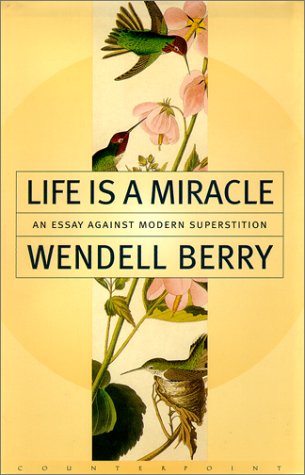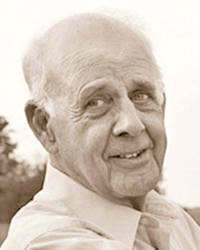 |
Home |
Catalogs |
Contact Us |

Books on:
Animal RightsBlack History
Clean Energy
Democracy
Eco Design
Eco History
Food and Nutrition
Genetic Engineering
Green Cities
Green Politics
Local Economics
Natural Building
Peace and Nonviolence
Simple Living
Trees and Forests
 |
Life is a Miracle
An Essay Against Modern Superstition
by Wendell Berry
Counterpoint Press, 2001
Purchase
on Amazon.com
Berry argues that religion and art are not subject to the reductionist and materialistic assumptions of modern science, and cannot be contained within its boundaries or explained by its explanations. He says the aims of science have become hard to distinguish from those of industry and commerce, and he advocates a new Emancipation Proclamation to free life itself from enslavement by the corporations and their scientific underlings. The aim, according to Berry, is not consilience, but conversation.
Praise for Life is a Miracle
"[A] scathing assessment [of E.O. Wilson's bestselling book, Consilience]. . . Berry shows that Wilson's much-celebrated, controversial pleas in Consilience to unify all branches of knowledge is nothing more than a fatuous subordination of religion, art, and everything else that is good to science. . . . Berry is one of the most perceptive critics of American society writing today."—Lauren F. Winner, Washington Post Book World
"Though a conservationist, like Wilson, Berry strongly believes that the materialist prescription for what ails us--ecologically, culturally and spiritually--will simply bind us more tightly to the often destructive, profit-driven triad of science, technology and industry. It will also move us further away, avers Berry, from what he sees as the sense of propriety that calls on us to base our thoughts and actions on our inescapable interdependency with the planet's other life forms. Berry also opposes the belief underlying Consilience, that scientific analysis can ultimately explain everything: 'to reduce the mystery and miracle of life to something that can be figured out is inevitably to enslave it, make property of it and put it up for sale.' In opposition to this view, Berry proposes evaluating our behavior and work on how they affect 'the health and durability of human and natural communities.' "--Publisher's Weekly
Quotes from Life is a Miracle
"The most radical influence of reductive science has been the virtually universal adoption of the idea that the world, its creatures, and all the parts of its creatures are machines—that is, that there is no difference between creature and artifice, birth and manufacture, thought and computation. Our language, wherever it is used, is now almost invariably conditioned by the assumption that fleshly bodies are machines full of mechanisms, fully compatible with the mechanisms of medicine, industry, and commerce; and that minds are computers fully compatible with electronic technology.
"This may have begun as a metaphor, but in the language as it is used (and as it affects industrial practice) it has evolved from metaphor through equation to identification. And this usage institutionalizes the human wish, or the sin of wishing, that life might be, or might be made to be, predictable."
. . .
"I am aware how brash this commentary will seem, coming from me, who have no competence or learning in science. The issue I am attempting to deal with, however, is not knowledge but ignorance. In ignorance I believe I may pronounce myself a fair expert.
"One of our problems is that we humans cannot live without acting; we have to act. Moreover, we have to act on the basis of what we know, and what we know is incomplete. What we have come to know so far is demonstrably incomplete, since we keep on learning more, and there seems little reason to think that our knowledge will become significantly more complete. The mystery surrounding our life probably is not significantly reducible. And so the question of how to act in ignorance is paramount.
"Our history enables us to suppose that it may be all right to act on the basis of incomplete knowledge if our culture has an effective way of telling us that our knowledge is incomplete, and also of telling us how to act in our state of ignorance. We may go so far as to say that it is all right to act on the basis of sure knowledge, since our studies and our experience have given us knowledge that seems to be pretty sure. But apparently it is dangerous to act on the assumption that sure knowledge is complete knowledge—or on the assumption that our knowledge will increase fast enough to outrace the bad consequences of the arrogant use of incomplete knowledge. To trust 'progress' or our putative 'genius' to solve all the problems that we cause is worse than bad science; it is bad religion."
. . .
"If we lack the cultural means to keep incomplete knowledge from becoming the basis of arrogant and dangerous behavior, then the intellectual disciplines themselves become dangerous. What is the point of the further study of nature if that leads to the further destruction of nature? To study the "purpose" of the organ within the organism or of the organism within the ecosystem is still reductive if we do so with the assumption that we will or can finally figure it out. This simply captures the world as the subject of present or future "understanding" which will become the basis of further industrial and commercial optimism, which will become the basis of further exploitation and destruction of communities, ecosystems, and local cultures.
"I am not of course proposing an end to science and other intellectual disciplines, but rather a change of standards and goals. The standards of our behavior must be derived, not from the capability of technology, but from the nature of places and communities. We must shift the priority from production to local adaptation, from innovation to familiarity, from power to elegance, from costliness to thrift. We must learn to think about propriety in scale and design, as determined by human and ecological health. By such changes we might again make our work an answer to despair."
Copyright © 2000 by Wendell Berry
Table of Contents of Life is a Miracle
- I. Ignorance
- II. Propriety
- III. On Edward O. Wilson's Consilience
- 1. Materialism
2. Materialism and Mystery
3. Imperialism
4. Reductionism
5. Creatures as Machines
6. Originality and the "Two Cultures"
7. Progress Without Subtraction
- IV. Reduction and Religion
- V. Reduction and Art
- VI. A Conversation Out of School
- VII. Toward a Change of Standards
- VIII. Some Notes in Conclusion
2. Materialism and Mystery
3. Imperialism
4. Reductionism
5. Creatures as Machines
6. Originality and the "Two Cultures"
7. Progress Without Subtraction
Reader Comments |
